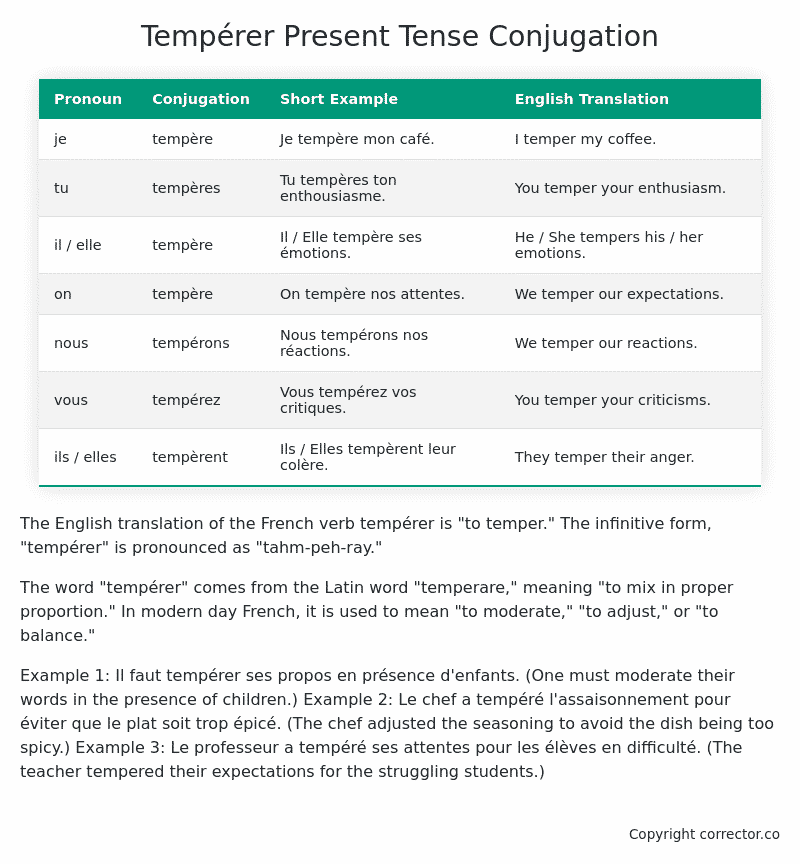Le Present (Present Tense) Conjugation of the French Verb tempérer
Introduction to the verb tempérer
The English translation of the French verb tempérer is “to temper.” The infinitive form, “tempérer” is pronounced as “tahm-peh-ray.”
The word “tempérer” comes from the Latin word “temperare,” meaning “to mix in proper proportion.” In modern day French, it is used to mean “to moderate,” “to adjust,” or “to balance.”
Example 1: Il faut tempérer ses propos en présence d’enfants. (One must moderate their words in the presence of children.)
Example 2: Le chef a tempéré l’assaisonnement pour éviter que le plat soit trop épicé. (The chef adjusted the seasoning to avoid the dish being too spicy.)
Example 3: Le professeur a tempéré ses attentes pour les élèves en difficulté. (The teacher tempered their expectations for the struggling students.)
Tempérer – About the French Present Tense
To take a deep dive into all the French tenses then see our article on Mastering French Tense Conjugation.
Common Everyday Usage Patterns For Le Present
Interactions with Other Tenses
Table of the Present Tense Conjugation of tempérer
| Pronoun | Conjugation | Short Example | English Translation |
|---|---|---|---|
| je | tempère | Je tempère mon café. | I temper my coffee. |
| tu | tempères | Tu tempères ton enthousiasme. | You temper your enthusiasm. |
| il / elle | tempère | Il / Elle tempère ses émotions. | He / She tempers his / her emotions. |
| on | tempère | On tempère nos attentes. | We temper our expectations. |
| nous | tempérons | Nous tempérons nos réactions. | We temper our reactions. |
| vous | tempérez | Vous tempérez vos critiques. | You temper your criticisms. |
| ils / elles | tempèrent | Ils / Elles tempèrent leur colère. | They temper their anger. |
Other Conjugations for Tempérer.
Le Present (Present Tense) Conjugation of the French Verb tempérer (this article)
Imparfait (Imperfect) Tense Conjugation of the French Verb tempérer
Passé Simple (Simple Past) Tense Conjugation of the French Verb tempérer
Passé Composé (Present Perfect) Tense Conjugation of the French Verb tempérer
Futur Simple (Simple Future) Tense Conjugation of the French Verb tempérer
Futur Proche (Near Future) Tense Conjugation of the French Verb tempérer
Plus-que-parfait (Pluperfect) Tense Conjugation of the French Verb tempérer
Passé Antérieur (Past Anterior) Tense Conjugation of the French Verb tempérer
Futur Antérieur (Future Anterior) Tense Conjugation of the French Verb tempérer
Subjonctif Présent (Subjunctive Present) Tense Conjugation of the French Verb tempérer
Subjonctif Passé (Subjunctive Past) Tense Conjugation of the French Verb tempérer
Subjonctif Imparfait (Subjunctive Imperfect) Tense Conjugation of the French Verb tempérer
Subjonctif Plus-que-parfait (Subjunctive Pluperfect) Tense Conjugation of the French Verb tempérer
Conditionnel Présent (Conditional Present) Tense Conjugation of the French Verb tempérer
Conditionnel Passé (Conditional Past) Tense Conjugation of the French Verb tempérer
L’impératif Présent (Imperative Present) Tense Conjugation of the French Verb tempérer
L’infinitif Présent (Infinitive Present) Tense Conjugation of the French Verb tempérer
Struggling with French verbs or the language in general? Why not use our free French Grammar Checker – no registration required!
Get a FREE Download Study Sheet of this Conjugation 🔥
Simply right click the image below, click “save image” and get your free reference for the tempérer Present Tense tense conjugation!

I hope you enjoyed this article on the verb tempérer. Still in a learning mood? Check out another TOTALLY random French verb present conjugation!


